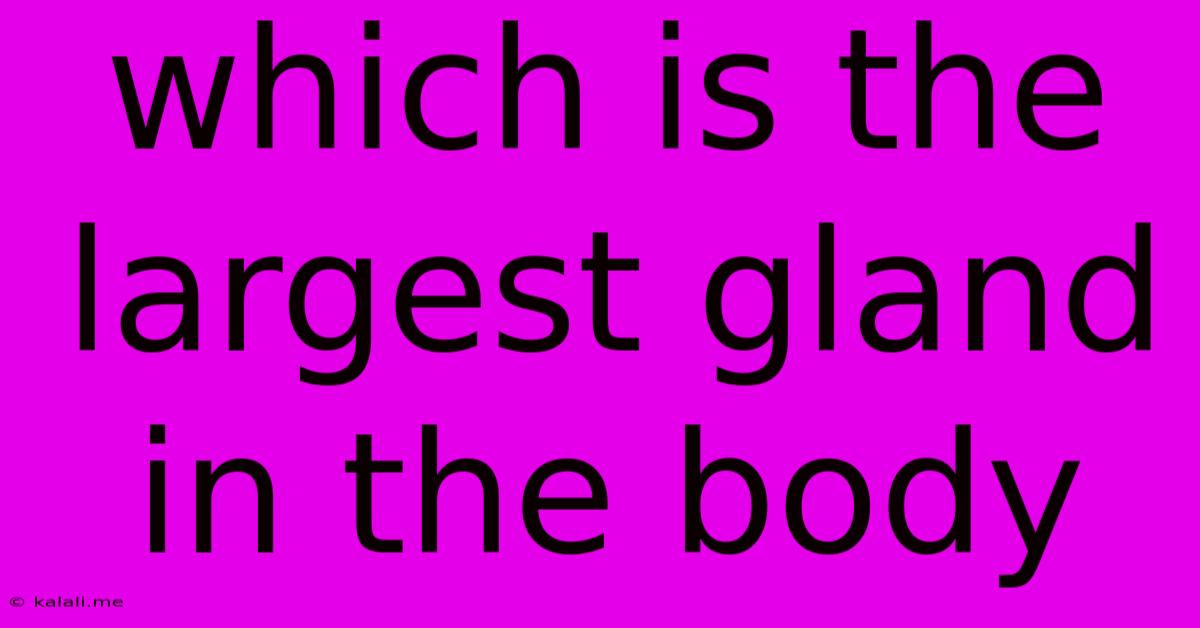Which Is The Largest Gland In The Body
Kalali
Jun 13, 2025 · 3 min read

Table of Contents
Which is the Largest Gland in the Body? Unveiling the Mighty Liver
The human body is a complex network of organs, each playing a crucial role in maintaining overall health. Among these vital components are glands, which secrete hormones and other substances essential for various bodily functions. But which gland reigns supreme as the largest? The answer may surprise you: it's the liver. This often-overlooked organ is a powerhouse, performing a multitude of functions vital for survival. This article delves deep into the liver's impressive size and its incredibly important role in the human body.
The liver, located in the upper right quadrant of the abdomen, is a surprisingly large organ. In an average adult, it can weigh between 1.4 and 1.6 kilograms (3 to 3.5 pounds) and is roughly the size of a football. Its substantial size reflects its extensive responsibilities within the body's intricate system. While other glands, such as the thyroid and pituitary gland, play crucial roles in hormone regulation, the liver’s sheer size underscores its multifaceted importance.
The Liver's Multitude of Functions: Beyond Just Size
The liver isn't just the largest gland; it's also one of the most versatile. Its functions are numerous and vital, encompassing metabolic processes, detoxification, and the production of essential substances. Here are some of its key roles:
- Detoxification: The liver acts as the body's primary filter, removing toxins, metabolic waste products, and drugs from the bloodstream. This crucial function protects the body from harmful substances. This includes processing alcohol and medications.
- Protein Metabolism: The liver plays a central role in protein synthesis, breaking down proteins and producing essential amino acids.
- Carbohydrate Metabolism: It regulates blood sugar levels by storing glucose as glycogen and releasing it into the bloodstream when needed. This is vital for maintaining energy levels.
- Fat Metabolism: The liver is involved in the breakdown and synthesis of fats, helping to regulate lipid levels in the blood.
- Bile Production: The liver produces bile, a crucial substance for the digestion and absorption of fats. Bile aids in the breakdown of fats into smaller molecules that can be absorbed by the intestines.
- Storage of Vitamins and Minerals: The liver acts as a storage depot for various essential vitamins and minerals, including vitamins A, D, E, K, and B12, as well as iron and copper. These are vital for a multitude of bodily processes.
- Production of Blood Clotting Factors: The liver synthesizes several proteins essential for blood clotting, preventing excessive bleeding.
- Immune System Support: The liver plays a role in immune function, helping to filter out pathogens and other harmful substances from the blood.
Understanding the Liver's Significance
The liver's impressive size directly correlates with its vast and crucial responsibilities. Its sheer scale reflects its essential contributions to nearly every aspect of bodily function. While other glands contribute significantly to overall health through hormone regulation, the liver's multifaceted role in metabolism, detoxification, and nutrient storage makes it the undeniable champion in terms of sheer size and impact.
Therefore, the next time you think about the largest gland in your body, remember the often-unsung hero – the mighty liver. Its vital functions and substantial size are a testament to its indispensable role in maintaining overall health and well-being. Understanding the liver's importance highlights the need for a healthy lifestyle to support this critical organ and ensure optimal bodily function.
Latest Posts
Latest Posts
-
Specific Gravity Of A Lead Acid Battery
Jun 13, 2025
-
What Is The Factor Of 57
Jun 13, 2025
-
What Is The Term For The Removal Of Metabolic Waste
Jun 13, 2025
-
An Inner Transition Metal With One 4f Electron
Jun 13, 2025
-
Elements Across A Series Have The Same Number Of
Jun 13, 2025
Related Post
Thank you for visiting our website which covers about Which Is The Largest Gland In The Body . We hope the information provided has been useful to you. Feel free to contact us if you have any questions or need further assistance. See you next time and don't miss to bookmark.